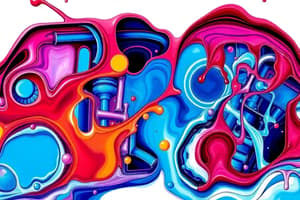Podcast
Questions and Answers
What is the purpose of the heater core in a car?
What is the purpose of the heater core in a car?
To warm up the passenger compartment
How do air cooled engines achieve cooling?
How do air cooled engines achieve cooling?
By using fins to pull heat away and relying on fans to force cool air over the fins
In what types of vehicles are air cooled engines commonly used?
In what types of vehicles are air cooled engines commonly used?
Motorcycles, all-terrain vehicles, riding lawn mowers, and aircraft
How was the engine 'Bart, nerd engine' cooled when it was overheating?
How was the engine 'Bart, nerd engine' cooled when it was overheating?
What is the purpose of the car's heater in cooling off an overheating engine?
What is the purpose of the car's heater in cooling off an overheating engine?
What are the common antifreeze chemicals?
What are the common antifreeze chemicals?
How does antifreeze prevent engine overheating and freezing?
How does antifreeze prevent engine overheating and freezing?
What is the purpose of corrosion inhibitors in antifreeze?
What is the purpose of corrosion inhibitors in antifreeze?
How does the radiator cap function in the cooling system?
How does the radiator cap function in the cooling system?
What is the role of the thermostat in the cooling system?
What is the role of the thermostat in the cooling system?
Study Notes
- Internal combustion engine produces a lot of heat and needs to be kept from overheating and freezing.
- Antifreeze, also known as coolant, is a liquid used to prevent engine overheating and freezing.
- Antifreeze lowers the freezing point and raises the boiling point in engine coolant.
- Ethylene glycol and propylene glycol are common antifreeze chemicals.
- Corrosion inhibitors are added to antifreeze to prevent rust on engine parts.
- Antifreeze needs to be replaced when it becomes brown or rusty.
- Coolant's freezing and boiling points depend on concentration of solutes in the solution.
- Antifreeze works by preventing crystalline structures from forming in the solution.
- Antifreeze is mixed with water in a specific ratio based on climate.
- Coolant flows through engine, collecting heat, and then circulates through radiator to be cooled by air.
- Water pump sends fluid to engine block and thermostat regulates amount of water that goes through radiator.
- Radiator takes heat from coolant and gives it to air, most modern cars use aluminum radiators.
- Radiator cap increases boiling point of coolant and acts as a pressure release valve.
- Coolant flows through overflow tube and back into overflow tank to maintain correct pressure in cooling system.
- Fans are now controlled externally to maintain a constant engine temperature.
- Heater core is a small radiator located in dashboard that passes fluid through heater core and back to pump to warm up the passenger compartment.- Heater core draws coolant from cylinder head and returns it to the pump, allowing engine to be cooled regardless of thermostat status.
- Car's heater can pull hot air from engine damper to cool off overheating engine.
- Engine cooling can be achieved through liquid or air, both methods using air to some extent for cooling.
- Air cooled engines use fins to pull heat away and rely on fans to force cool air over fins.
- Boxer engines, such as those found in old Porsches and VWs, have exposed surfaces and distinctive holes to allow maximum air flow.
- Air cooled engines last longer with sufficient air flow and are commonly used in motorcycles, all-terrain vehicles, riding lawn mowers, and aircraft.
- Engine in question, named "Bart, nerd engine," was overheating and was cooled by adding coolant.
- "Bart, nerd engine" is now cooled and is excited to go to prom.
- Subscribe to Donut for new shows and merchandise, follow @donutmedia and @bidsbarto on social media.
Studying That Suits You
Use AI to generate personalized quizzes and flashcards to suit your learning preferences.
Description
Test your knowledge on antifreeze, engine cooling, and cooling system components such as radiators, water pumps, and thermostat. Explore the roles of ethylene glycol, propylene glycol, and corrosion inhibitors in preventing overheating and freezing. Also learn about the functions of fans, heater core, radiator cap, and different engine cooling methods.



